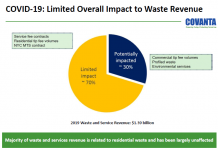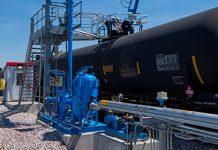Jim Lane
In Nebraska, word has arrived from Green Plains (GPRE) that it will purchase the Madison, Ill., Mount Vernon, Ind. and York, Neb. ethanol facilities from Abengoa (ABGOY) Bioenergy with combined annual production capacity of 236 million gallons per year, for approximately $237 million in cash, plus certain working capital adjustments.
The company said it was the successful bidder on three ethanol plants for sale conducted under the provisions of the U.S. Bankruptcy Code.
Upon completion of the acquisitions, Green Plains will own and operate 17 dry mill ethanol facilities with combined production capacity of nearly 1.5 billion gallons per year. With ADM (ADM) putting US ethanol assets on the sale block, the acquisition leaves Green Plains and POET alone at the top in terms of US production capacity.
It was less than five years ago in 2011 that we reported:
“Green Plains Renewables says that the days of snapping up cheap ethanol assets are over, as all opportunities for buying up the right equipment at the right location for under $1 per gallon of installed capacity have been bought up.”
Yet, the acquisitions in this case came at that magic $1 per gallon figure. According to CARD, the return over operating costs for ethanol plants, currently, is hovering between $0.40 and $0.50, suggesting that the payback time for this investment will be between 2 and 2.5 years.
A note on CARD operating profit forecasts. CARD says, “This return is calculated as the difference between the revenues from ethanol plant outputs (ethanol and dried distillers grains with solubles [DDGS]) and the costs of variable production inputs (corn, natural gas, and other costs such as enzymes, labor, electricity and water).” More about those projections and assumptions here.
The road to 1.5 billion gallons
2010: Green Plains acquired Global Ethanol’s two operating ethanol plants located in Lakota, IA and Riga, MI with a combined annual production capacity of approximately 157 MGy. The acquisition increased Green Plains’ capacity by 31% to approximately 657 Mgy. The company paid approximately $169.2 million, including approximately $147.6 million for the ethanol production facilities and the balance in working capital.
2011: The company’s round of expansion closed with the purchase of the 55 million gallon per year Fergus Falls ethanol plant for $55 million, which at the time confirmed its status as the fourth-largest ethanol producer behind POET, ADM and Valero.
2013. Green Plains acquired two ethanol plants of BioFuel Energy Corp. for approximately $101 million, plus working capital at closing, from an entity composed of its lender group. Green Plains intended to fund the purchase with approximately $77 million in term debt and the balance in cash. The ethanol plants are located in Wood River, NE and Fairmont, MN. The two facilities have a combined annual production capacity of approximately 220 million gallons.
2015. Green Plains acquired Hereford Renewable Energy, LLC for approximately $93.8 million. The transaction value included $78.5 million for the ethanol production facility with the balance for working capital. The transaction is expected to close this month subject to customary closing conditions and regulatory approvals. The facility is a Lurgi-designed, ICM-modified ethanol plant with approximately 100 million gallons per year of production capacity, a corn oil extraction system and other related assets.
2015. Green Plains acquired an idled ethanol production facility in Hopewell, Virginia, located approximately 20 miles south of Richmond, from Future Fuels LLP. The company paid $18.25M for the capacity. Operating at full capacity, the facility’s dry mill ethanol plant will increase the company’s annual production capacity by approximately 60 million gallons to nearly 1.1 billion gallons per year. Production is expected to resume by the end of the year and corn oil processing is expected to be operational during the second quarter of 2016.
2016. Still on the hunt. Green Plains is taking advantage of low investor interest in biofuels, we reported, thanks to depressed crushing margins. The company is on the hunt to acquire new assets as well as expand production capacity organically, we reported, despite its own weak performance and rising supplies. Even with weak oil prices, CEO Todd Becker said that international demand for US ethanol has not slumped off and instead expects total exports this year to surpass last year, perhaps even reaching 1 billion gallons.
Consolidation
There’s continuing consolidation in the corn ethanol space. Last year, Aventine merged into Pacific Ethanol. The previous September, Flint Hills Resources acquired Southwest Georgia Ethanol’s plant in Camilla, Georgia, the company’s fourth acquisition in a one year period. The company purchased an Iowa plant from Platinum Ethanol. Since then it had begun retrofitting a Southeast Nebraska plant and bought out Petrologistics.
More Consolidation on the Way?
Yes, ADM has put US-based ethanol assets on the block.
We reported earlier this month that ADM now expects to receive bids by the end of August following presentations to seven potential buyers. Half of the company’s 1.8 billion gallons of ethanol production occurs at its three dry mills. Weak ethanol margins were among the reasons for the company failing it hit analysts’ expectations for Q2 in its reporting this week. But we are not expecting the assets to be sold at the $1 per gallon mark and, given that Green Plains is going to be absorbing this set of plants, we’re doubtful that they will be paying top dollar in an auction for ADM’s assets.
Get strong, the Green Plains way
We looked at the Green Plains growth story in November 2015, here, and wrote of “lessons learned”:
1. Get a lead product that’s a platform for a company. Green Plains began as a one-horse ethanol producer with two products, corn ethanol and distillers grains. There were unanswered questions at the time about the market acceptance of the products, the viability of the sector, and whether Green Plains could scale to industry-leading size, and when. They chose, in corn ethanol, a product that can support a company, rather than ease a bu
rn rate and provide some hope to investors. There are $1 million lead products and $100 million lead products and $1 billion lead products. The first provides hope and not much more, the second eases a burn rate, the latter
2. Gain strength by applying advanced technologies to advance the business proposition. Today, Green Plains has more than a billion gallons in ethanol production capacity, and is making money even in a tough ethanol market; it has spun off Green Plains Partners (GPP) into a successful IPO and reported its first dividend to shareholders in that venture this week; it has diversified into corn oil and is working hard on monetizing its CO2 production. It is acquiring terminal capacity as well as production capacity.
Reaction from Planet Green Plains
“We continue to focus on making strategic investments in high quality assets as we expand our production footprint,” said Todd Becker, president and chief executive officer at Green Plains. “The Madison and Mount Vernon plants will give us access to the Mississippi River, supporting our new export terminal planned in Beaumont, Texas. In addition, we will broaden our product offering globally with industrial alcohol production at the York plant. These acquisitions further our commitment to deliver long-term value for both Green Plains Inc. and Green Plains Partners shareholders.”
Closing details
The company’s acquisition agreements are subject to review and approval by the U.S. Bankruptcy Court for the Eastern District of Missouri at a hearing currently scheduled for Aug. 29, 2016. The acquisitions are expected to be complete no later than Sept. 30, 2016, subject to regulatory approval and customary closing conditions, at which time the ethanol storage and transportation assets will be offered to Green Plains Partners.
Green Plains Inc. is a diversified commodity-processing business with operations related to ethanol, distillers grains and corn oil production; grain handling and storage; a cattle feedlot; and commodity marketing and distribution services. The company processes 12 million tons of corn annually, producing over 1.2 billion gallons of ethanol, approximately 3.5 million tons of livestock feed and 290 million pounds of industrial grade corn oil at full capacity. Green Plains owns a 62.5% limited partner interest and a 2.0% general partner interest in Green Plains Partners LP (NASDAQ:GPP), a fee-based Delaware limited partnership that provides fuel storage and transportation services by owning, operating, developing and acquiring ethanol and fuel storage tanks, terminals, transportation assets and other related assets and businesses.
Jim Lane is editor and publisher of Biofuels Digest where this article was originally published. Biofuels Digest is the most widely read Biofuels daily read by 14,000+ organizations. Subscribe here.









